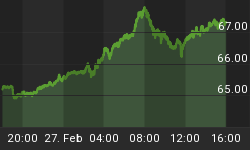Suddenly, it seems like a growth scare is in the air. Sometimes it isn't clear where these things come from, but the seeming decision of investors to lighten up a little on equities for bonds and to exit Crude Oil seems to point to an oddly-timed concern about the levels of markets considering economic growth prospects.
To be sure, I concur with the skepticism that the growth we are likely to get - slow, but with some chances of a relapse - can support this level of equities. But market interest rates were already pricing in very slow growth (10y real rates below 1%) and increasing inflation; slower growth may quell some of the inflation fears but it is hard to think that real rates are too aggressively high here. And as of the close, they are 7bps lower. 10-year real yields at 0.86%? Those yields are as low as they are because the Fed has been buying all available supply, but on my metrics they look rich (and remember, I'm not exactly sanguine on growth). Indeed, in our "Four-Real" model TIPS are now weighted even less than equities, and that hasn't happened since the end of 2009. A portfolio needs inflation protection, and given the alternatives it's difficult to dislike commodities.
Also, oil prices are not where they are because the economy is booming; oil prices are well over $100 because of unrest in the Middle East and a persistently weak dollar. Neither of those things has changed, so some part of the oil drop seems to be either hot money exiting or hot money getting short. With Libya a questionable exporter for the moment and increasing demand for fossil fuels from formerly-nuclear nations including of course Japan but also several European states, the supply/demand imbalance doesn't seem to favor an extended slide in energy prices, especially if the dollar remains weak. Now, other commodities dunked as well, and the imbalances are not as favorable in all of them as they are in energy.
It always amazes me how investors can just flip from "risk-on, growth is great" to "risk-off, growth is looking weak" for seemingly no reason, after previously ignoring lots of good reasons to reverse. I don't spend a lot of time worrying about the precipitating factor - the clouds were pregnant, and eventually rain was going to fall, but predicting just what causes those first raindrops to form is pure guesswork. Maybe the slightly-weak results from Alcoa spooked investors, or perhaps it was the weakness in Machine Orders and Machine Tool Orders in Japan that highlight the (not surprising) fact that the disaster will have a major effect on one of the world's largest economic engines (and this fact has been amazingly unappreciated by western economists). Maybe someone big just decided suddenly to get out of commodities and a bit of stocks and sashay into bonds. Or maybe, with taxes due this Friday, investors chose the last possible day to unwind positions and still realize the cash in time to pay Uncle Sam.
So is the long commodity march over? The drop in front Crude to $106.25, down $4 in three days (it makes better news to say it's down more than $6 in two days, but remember it spiked higher on Friday) isn't really a big deal although it seems to damage the technical picture some. Still, the fact that the 'sky is falling' hyperbole was pulled out so rapidly - my favorite story was "Crude Oil Plunges as Higher Prices Are Forecast to Curb Growth"; in other words higher prices are causing lower prices - is comforting.
It is easy to run the sound bite that the decline "could have a lot further to go," and to say that Crude (and other commodity markets) are "overbought." Are they? Look at the chart below, which shows Crude denominated in dollars, Euro, and Sterling for the last ten months (to the dollar peak, basically). It is normalized so that they are all starting at 100 and therefore the price represents 100 plus the percentage gain.

Perhaps oil is overbought in dollars, but in Euro?
In dollars, oil is up 46% or so in ten months, which sounds a little overbought. But implied volatility for front Crude is 31%, so this is about a 1.5 standard deviation move. That 46% price increase, at normal sorts of pass-through assumptions, adds something like 2% to headline inflation on top of core. So it's a lot, but not exactly outrageous. And if you're in Europe, that rise in the dollar price of oil is defrayed by the strength of the Euro, so your prices have only risen about 23.5% over ten months. Considering there are multiple conflicts in the MENA region and nuclear reactors are being shut off all over the world...that doesn't sound too "overbought" to me except in a narrow, short-term technical sense.
Tomorrow's economic data are likely to temper the fear of an abrupt slowdown, at least a little bit (although that's not guaranteed to reverse the "risk-off" mood if that is what is happening!). Retail Sales (Consensus: +0.5%, +0.7% ex-auto) is likely to put in the ninth straight solid number in terms of core retail sales. JP Morgan Chase's earnings are due before the open, and it will be quite a surprise if they miss earnings given the shape of the yield curve (even though volumes and margins are down). The afternoon sees the Beige Book, which ought to be generally upbeat as well. This isn't to say that I believe all the hype, just that I am very suspicious about a sudden change in mood. Bond and stock markets are expensive, whether there is growth or not, but there is more to the story than the growth dynamic. I am negative on stocks and nominal bonds; I view TIPS as expensive although I think they will remain fairly expensive until QE2 ends; I think commodity indices are still fairly reasonable.















